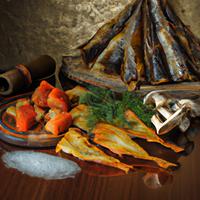
1 serving (50 grams) contains 145 calories, 31.0 grams of protein, 1.2 grams of fat, and 0.0 grams of carbohydrates.

Log this food in SnapCalorie

Nutrition Information
Calories |
725 | ||
|---|---|---|---|
% Daily Value* |
|||
| Total Fat | 6 g | 7% | |
| Saturated Fat | 1 g | 5% | |
| Polyunsaturated Fat | 0 g | ||
| Cholesterol | 375 mg | 125% | |
| Sodium | 1825 mg | 79% | |
| Total Carbohydrates | 0 g | 0% | |
| Dietary Fiber | 0 g | 0% | |
| Sugars | 0 g | ||
| protein | 155 g | 310% | |
| Vitamin D | 0 mcg | 0% | |
| Calcium | 150 mg | 11% | |
| Iron | 3 mg | 16% | |
| Potassium | 450 mg | 9% | |
* Percent Daily Values are based on a 2,000 calorie diet. Your daily values may be higher or lower depending on your calorie needs.
Food Attributes
Source of Calories
About Dried cod
Dried cod, commonly known as codfish, is a nutrient-rich food that has been enjoyed across numerous cuisines for centuries. Originating from traditional preservation methods in Europe, particularly Norway and Portugal, dried cod is created by removing moisture through air-drying or salting, making it shelf-stable and perfect for long-term storage. Packed with high-quality protein, dried cod is an excellent source of essential amino acids that support muscle growth and repair. It also contains vital minerals such as potassium, selenium, and phosphorus, alongside heart-healthy omega-3 fatty acids. While naturally low in fat, salted versions can be high in sodium, so moderation is recommended for those monitoring blood pressure. Often rehydrated and featured in dishes like Bacalhau from Portugal or brandade in French cuisine, dried cod's mild flavor makes it a versatile ingredient for nutritious, satisfying meals worldwide.



